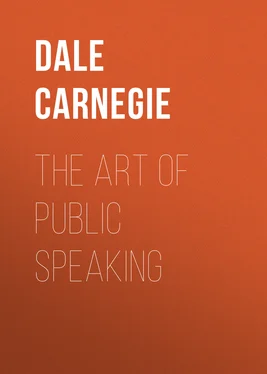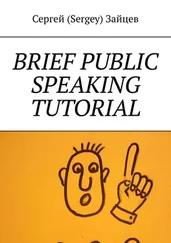2. Live over in your imagination all the solemnity and sorrow that Lincoln felt at the Gettysburg cemetery. The feeling in this speech is very deep, but it is quieter and more subdued than the preceding one. The purpose of Henry's address was to get action; Lincoln's speech was meant only to dedicate the last resting place of those who had acted. Read it over and over (see page 50) until it burns in your soul. Then commit it and repeat it for emotional expression.
3. Beecher's speech on Lincoln, page 76; Thurston's speech on "A Plea for Cuba," page 50; and the following selection, are recommended for practise in developing feeling in delivery.
A living force that brings to itself all the resources of imagination, all the inspirations of feeling, all that is influential in body, in voice, in eye, in gesture, in posture, in the whole animated man, is in strict analogy with the divine thought and the divine arrangement; and there is no misconstruction more utterly untrue and fatal than this: that oratory is an artificial thing, which deals with baubles and trifles, for the sake of making bubbles of pleasure for transient effect on mercurial audiences. So far from that, it is the consecration of the whole man to the noblest purposes to which one can address himself—the education and inspiration of his fellow men by all that there is in learning, by all that there is in thought, by all that there is in feeling, by all that there is in all of them, sent home through the channels of taste and of beauty.—Henry Ward Beecher.
4. What in your opinion are the relative values of thought and feeling in a speech?
5. Could we dispense with either?
6. What kinds of selections or occasions require much feeling and enthusiasm? Which require little?
7. Invent a list of ten subjects for speeches, saying which would give most room for pure thought and which for feeling.
8. Prepare and deliver a ten-minute speech denouncing the (imaginary) unfeeling plea of an attorney; he may be either the counsel for the defense or the prosecuting attorney, and the accused may be assumed to be either guilty or innocent, at your option.
9. Is feeling more important than the technical principles expounded in chapters III to VII? Why?
10. Analyze the secret of some effective speech or speaker. To what is the success due?
11. Give an example from your own observation of the effect of feeling and enthusiasm on listeners.
12. Memorize Carlyle's and Emerson's remarks on enthusiasm.
13. Deliver Patrick Henry's address, page 110, and Thurston's speech, page 50, without show of feeling or enthusiasm. What is the result?
14. Repeat, with all the feeling these selections demand. What is the result?
15. What steps do you intend to take to develop the power of enthusiasm and feeling in speaking?
16. Write and deliver a five-minute speech ridiculing a speaker who uses bombast, pomposity and over-enthusiasm. Imitate him.
CHAPTER XI
FLUENCY THROUGH PREPARATION
Table of Contents
Animis opibusque parati—Ready in mind and resources.
— Motto of South Carolina .
In omnibus negotiis prius quam aggrediare, adhibenda est præparatio diligens—In all matters before beginning a diligent preparation should be made.
—Cicero, De Officiis .
Take your dictionary and look up the words that contain the Latin stem flu —the results will be suggestive.
At first blush it would seem that fluency consists in a ready, easy use of words. Not so—the flowing quality of speech is much more, for it is a composite effect, with each of its prior conditions deserving of careful notice.
The Sources of Fluency
Speaking broadly, fluency is almost entirely a matter of preparation. Certainly, native gifts figure largely here, as in every art, but even natural facility is dependent on the very same laws of preparation that hold good for the man of supposedly small native endowment. Let this encourage you if, like Moses, you are prone to complain that you are not a ready speaker.
Have you ever stopped to analyze that expression, "a ready speaker?" Readiness, in its prime sense, is preparedness, and they are most ready who are best prepared. Quick firing depends more on the alert finger than on the hair trigger. Your fluency will be in direct ratio to two important conditions: your knowledge of what you are going to say, and your being accustomed to telling what you know to an audience. This gives us the second great element of fluency—to preparation must be added the ease that arises from practise; of which more presently.
Knowledge is Essential
Mr. Bryan is a most fluent speaker when he speaks on political problems, tendencies of the time, and questions of morals. It is to be supposed, however, that he would not be so fluent in speaking on the bird life of the Florida Everglades. Mr. John Burroughs might be at his best on this last subject, yet entirely lost in talking about international law. Do not expect to speak fluently on a subject that you know little or nothing about. Ctesiphon boasted that he could speak all day (a sin in itself) on any subject that an audience would suggest. He was banished by the Spartans.
But preparation goes beyond the getting of the facts in the case you are to present: it includes also the ability to think and arrange your thoughts, a full and precise vocabulary, an easy manner of speech and breathing, absence of self-consciousness, and the several other characteristics of efficient delivery that have deserved special attention in other parts of this book rather than in this chapter.
Preparation may be either general or specific; usually it should be both. A life-time of reading, of companionship with stirring thoughts, of wrestling with the problems of life—this constitutes a general preparation of inestimable worth. Out of a well-stored mind, and—richer still—a broad experience, and—best of all—a warmly sympathetic heart, the speaker will have to draw much material that no immediate study could provide. General preparation consists of all that a man has put into himself, all that heredity and environment have instilled into him, and—that other rich source of preparedness for speech—the friendship of wise companions. When Schiller returned home after a visit with Goethe a friend remarked: "I am amazed by the progress Schiller can make within a single fortnight." It was the progressive influence of a new friendship. Proper friendships form one of the best means for the formation of ideas and ideals, for they enable one to practise in giving expression to thought. The speaker who would speak fluently before an audience should learn to speak fluently and entertainingly with a friend. Clarify your ideas by putting them in words; the talker gains as much from his conversation as the listener. You sometimes begin to converse on a subject thinking you have very little to say, but one idea gives birth to another, and you are surprised to learn that the more you give the more you have to give. This give-and-take of friendly conversation develops mentality, and fluency in expression. Longfellow said: "A single conversation across the table with a wise man is better than ten years' study of books," and Holmes whimsically yet none the less truthfully declared that half the time he talked to find out what he thought. But that method must not be applied on the platform!
After all this enrichment of life by storage, must come the special preparation for the particular speech. This is of so definite a sort that it warrants separate chapter-treatment later.
Practise
But preparation must also be of another sort than the gathering, organizing, and shaping of materials—it must include practise , which, like mental preparation, must be both general and special.
Читать дальше












